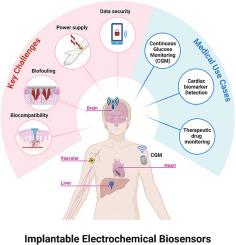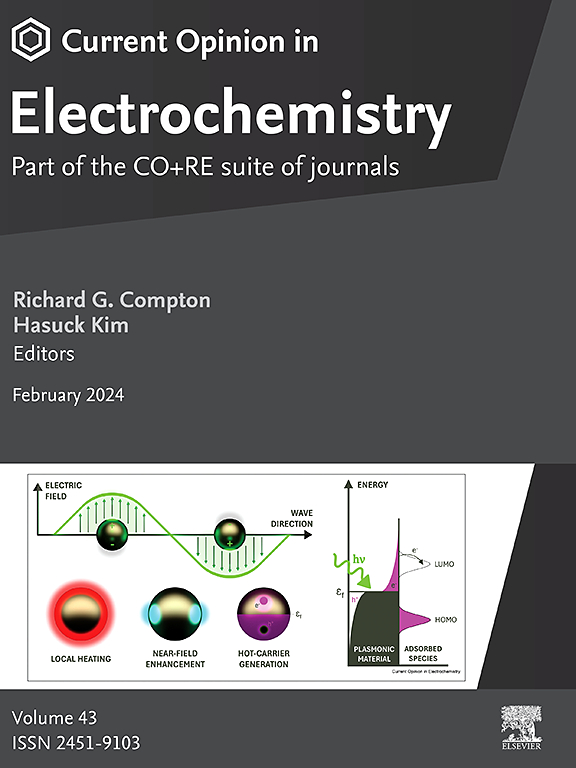植入式电化学生物传感器:挑战、策略和应用
IF 6.9
2区 化学
Q1 CHEMISTRY, PHYSICAL
引用次数: 0
摘要
将生物传感器技术应用于包括人类在内的生物的连续、实时测量,为更好地了解正常生理和疾病提供了一系列令人兴奋的可能性。它还伴随着一系列技术、伦理和监管需求,这使得电化学生物传感器从体外到体内的过渡非常具有挑战性。本文综述了植入式电化学生物传感器组成的研究进展。这些包括分子识别元件的集成、材料设计、电力供应、仪器封装和通信协议的制造。仍然存在的重大挑战包括与生物相容性、无菌性、设备寿命、校准和用户可接受性相关的挑战。无论是医疗设备还是消费设备的监管方面都是至关重要的,需要在设备设计中尽早考虑,植入传感器最终将解决的用例也是如此。本文章由计算机程序翻译,如有差异,请以英文原文为准。

Implantable electrochemical biosensors: Challenges, strategies, and applications
Applying biosensor technologies to continuous, real-time measurements in living creatures, including humans, offers an exciting range of possibilities for a better understanding of both normal physiology and disease. It also comes with a collection of technical, ethical and regulatory needs that render the transition of electrochemical biosensors from in vitro to in vivo exceptionally challenging. In this review, we address the advances in the components of implantable electrochemical biosensors. These include the integration of molecular recognition elements, materials design, supply of electrical power, fabrication of instrumentation packages and communications protocols. Significant challenges that remain include those associated with biocompatibility, sterility, device lifetime, calibration and user acceptability. Regulatory aspects whether of medical or consumer devices are essential to address and need to be an early consideration in device design, as are the use cases to which the implanted sensor will ultimately address.
求助全文
通过发布文献求助,成功后即可免费获取论文全文。
去求助
来源期刊

Current Opinion in Electrochemistry
Chemistry-Analytical Chemistry
CiteScore
14.00
自引率
5.90%
发文量
272
审稿时长
73 days
期刊介绍:
The development of the Current Opinion journals stemmed from the acknowledgment of the growing challenge for specialists to stay abreast of the expanding volume of information within their field. In Current Opinion in Electrochemistry, they help the reader by providing in a systematic manner:
1.The views of experts on current advances in electrochemistry in a clear and readable form.
2.Evaluations of the most interesting papers, annotated by experts, from the great wealth of original publications.
In the realm of electrochemistry, the subject is divided into 12 themed sections, with each section undergoing an annual review cycle:
• Bioelectrochemistry • Electrocatalysis • Electrochemical Materials and Engineering • Energy Storage: Batteries and Supercapacitors • Energy Transformation • Environmental Electrochemistry • Fundamental & Theoretical Electrochemistry • Innovative Methods in Electrochemistry • Organic & Molecular Electrochemistry • Physical & Nano-Electrochemistry • Sensors & Bio-sensors •
 求助内容:
求助内容: 应助结果提醒方式:
应助结果提醒方式:


